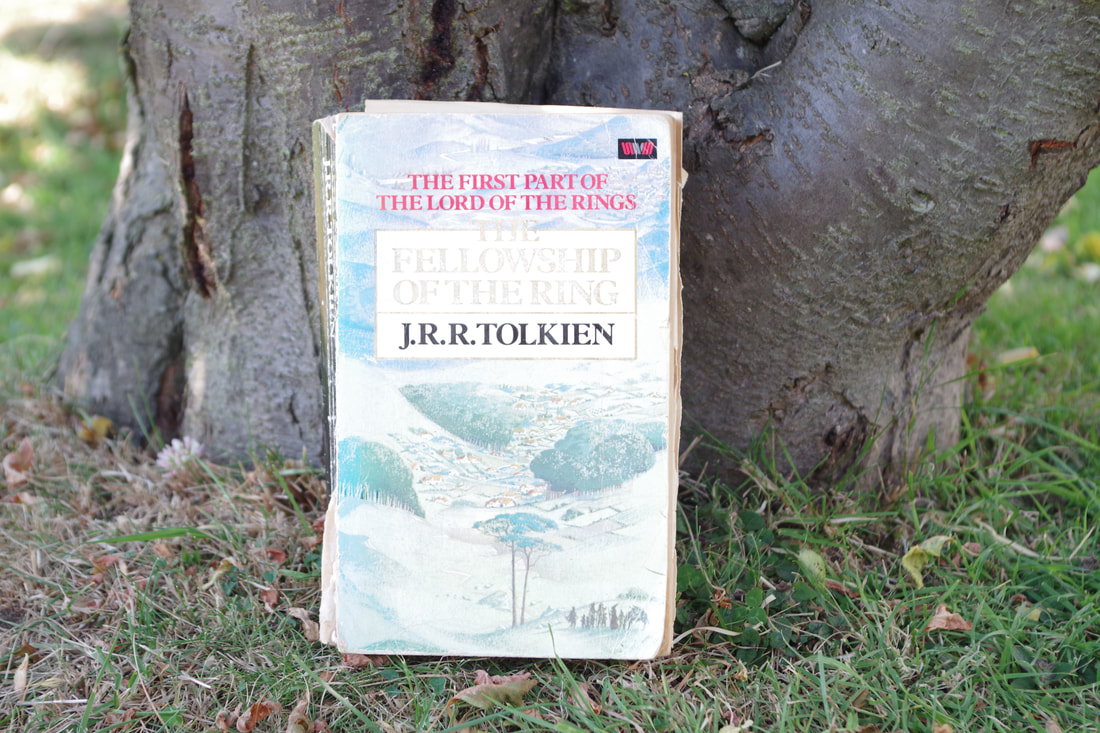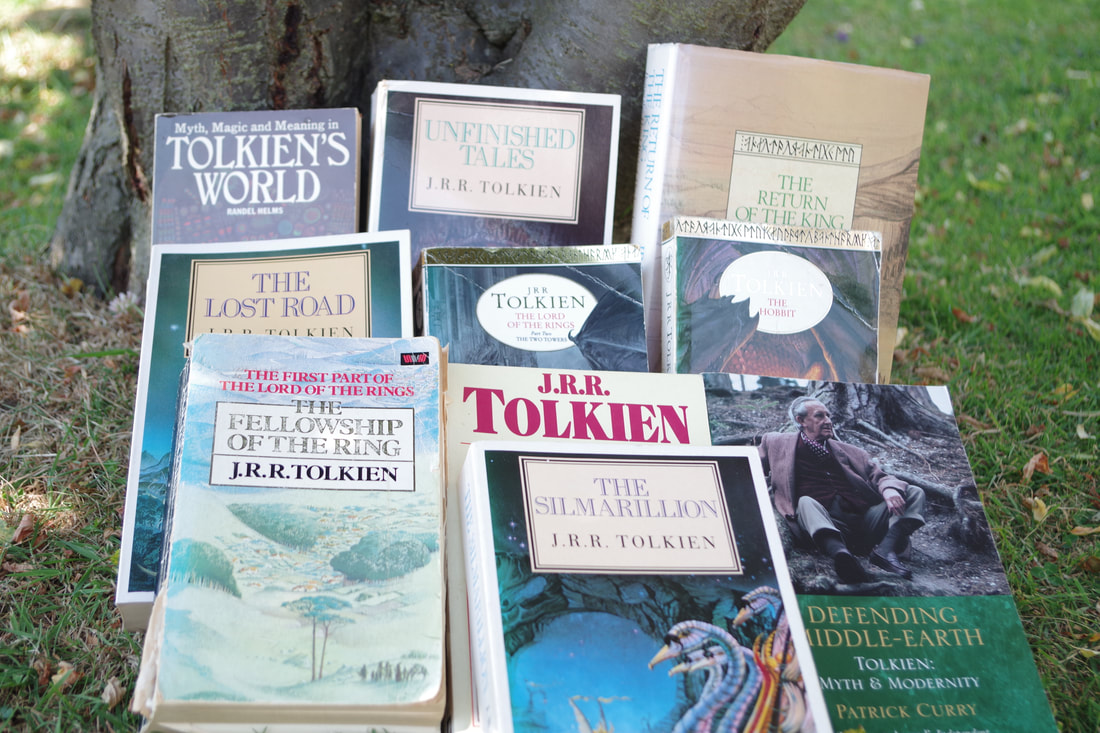|
In 2018 I was lucky enough to visit the Tolkien: Maker of Middle Earth exhibition at the Bodleian Library in Oxford.
The exhibition displayed an array of drafts, illustrations and maps for The Hobbit and The Lord of The Rings, as well as some of J.R.R. Tolkien’s early paintings and other objects such as fan mail and private letters. I gained a real sense of the depth and scale of Tolkien’s creation, and how his formidable imagination poured out prose, poetry and art.
And the exhibition reminded me how important Tolkien, and in particular The Lord of the Rings, has been to my own creativity – although there are many wonderful authors whose books fascinate and inspire me, I have little doubt Tolkien is the author who first sparked within me the desire to write fiction.
My first encounter with Tolkien was watching Ralph Bakshi’s animated The Lord of the Rings on VHS as a child. At the time, I didn’t fully understand the film (and it is fair to say it divides fans of the book - I’m very fond of it though) but the imagery, especially the Black Riders and the scenes in the Mines of Moria, stayed with me and when a little older, about fourteen, I decided to read The Fellowship of the Ring.
Although familiar with some elements of the story from the film, I soon realized that there was more, so much more, to discover in the book, and not just the main narrative, but the many other details and subplots: such as the Barrow Wights, old Tom Bombadil, the wolves pursuing the fellowship to the gates of Moria. Somehow, the experience of reading is more intense as a child or young person – for example, I can well remember the first time I read books such as Watership Down and The Lion, the Witch and the Wardrobe. The Fellowship of the Ring surpassed even these, and I still have the same paperback – it has been with me through university and several house moves since; it is battered, torn and the spine is held together (more or less) by sellotape, but I treasure no book more.
And of course, once I’d finished The Fellowship of the Ring, I was hungry for more! My brother kindly picked up The Two Towers from the library close to where he worked and I can still remember my excitement at first seeing the cover, which showed the Eye of Sauron. From the excitement and heroism of Helm’s Deep to the horror of Shelob, the story engrossed me, and for a few days I resented interruptions such as sleep and meals! And then from The Two Towers to the climatic Return of the King, where the word epic hardly suffices, with the mighty struggles at Minas Tirith and the last stand in front of the Gates of Mordor, and of course Frodo and Sam’s painful journey to Mount Doom. I remember being struck, and moved, by the sense of melancholy at the end of the story. Sauron and Saruman had been defeated, but at great cost, from the light of the Elves departing Middle Earth, to the pain and sadness of Frodo.
No book had had such an impact on me before, and I don't think one has had such an impact since. After finishing The Lord of the Rings, I launched into The Hobbit and The Silmarillion, and then read many other books by and about Tolkien - he became my writer, the writer who seemed to capture the things I was fascinated by, moved by, and I'm sure thousands more have felt the same! Tolkien’s detractors frequently dismiss his books as quaint, juvenile, somehow out-of-step with modern concerns and styles, but I think this underestimates his work. Although Tolkien famously disliked and dismissed allegory, The Lord of the Rings holds relevance for today’s world, from the ecological damage wrought by rapid industrialization, to the misuse of power, and the elimination of indigenous people. Tolkien had a respect for the simple pleasures of life, for the beauty of the natural world, and the importance of playing our part in preserving rather than exploiting. To use a personal example, the village in which I live is being progressively bloated by new housing, new developments, with acres of meadows and fields disappearing under concrete, hedges and trees – each home to a delicate ecology – ripped up to make way for new roads, the songs of birds and the hum of insects replaced by the remorseless and deadening drone of traffic. The malevolent spirit of Saruman endures – his Voice lives on, potent and cunning, cloaked in fine words such as ‘innovative planning solutions’ and ‘sustainable locations for development’. Tolkien had witnessed such ‘progress’ in his beloved Midlands, and his fears and anger about this helped fueled the creation of The Lord of the Rings. We would do well to heed his dire warnings.
And even putting aside the powerful themes of The Lord of the Rings, it is still a story that gives immense pleasure to readers – the joy of a good story well-told is surely a primal human trait, because we are, I believe, profoundly storytelling beings. Steeped in Beowulf, the Kalevala, and countless other tales, Tolkien built his stories on strong foundations, which is one of the reasons why Middle Earth feels simultaneously magical and familiar.
Tolkien’s work has influenced my writing, most directly The Tree of Life trilogy, and not just in the sense that it is an epic fantasy story across a ‘secondary world’ with hundreds of characters and different cultures, but I wanted to capture similar themes to those present in The Lord of the Rings – for example, the sense of a threatened environment, even a dying world, pervades the whole series from the first book (The Map of the Known World) onwards. My most recent novel, This Sacred Isle, echoed Tolkien not only in its mythological roots and elements, but also, being set in Anglo-Saxon England, the influence of Beowulf, one of Tolkien’s literary and imaginative touchstones, is strong. And above all, I strive to create books for readers to get lost in, to capture something of the sense of escapism and wonder I discovered reading The Lord of the Rings. I would never claim to be in Tolkien’s class as a writer, but he inspires me to write, inspires me to push my creativity as far as possible. Reading tastes and habits change and broaden over the years, but I will always hold Tolkien’s work, and especially The Lord of the Rings, in the highest regard. Tolkien has been a key part of my imaginative life since childhood and I am certain that will never change. Which author has most influenced and inspired you? Add a comment and join the conversation. If you’re interested in my writing, you can get the ebook version of my first novel - The Map of the Known World – for just 99p / 99c or FREE to read with Kindle Unlimited. Please see the following Kindle preview:
2 Comments
22/7/2023 03:12:22 am
Baskets Tn Plus Homme Chaussures Entrainement de Sport Blanc Bleu Noir https://www.tkktn.com/
Reply
Leave a Reply. |
Archives
October 2023
Categories
All
|


 RSS Feed
RSS Feed